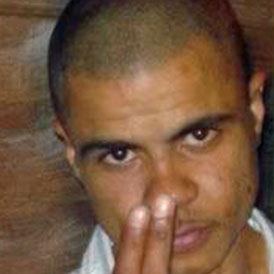Parents not informed about Mark Duggan’s death, says IPPC
As an investigation finds that the parents of Mark Duggan were not told of their son’s death by either police or the IPCC, Simon Israel speaks to family members.

Mark Duggan was shot and killed by Metropolitan Police officers on 4 August 2011 in Tottenham. An Independent Police Complaints Commission (IPCC) investigation into the full circumstances of this shooting is ongoing.
In the days after Mr Duggan’s death, riots broke out in north London and spread across the capital and to other English cities.
Following the shooting there was widespread criticism of the police and the IPCC for what was perceived to be a lack of adequate contact with, and support for, Mr Duggan’s family.
The investigation has upheld the family’s complaint after it was found that his parents were not informed of Mr Duggan’s death by either the Metropolitan Police Service (MPS) or the IPCC.
The full investigation report said on the evening of the shooting Mr Duggan’s sister and Mr Duggan’s partner Semone Wilson attended the scene and talked to police family liaison officers (FLO).
With the benefit of hindsight, the IPCC should have explored the family’s wishes in more depth
The report noted that while this fact is not disputed by these family members, their accounts of discussions with the FLOs at the scene differ significantly from those provided by the FLOs.
The FLOs told the investigation that they told both family members at the scene of Mr Duggan’s death and although they proposed visiting the family home to inform Mr Duggan’s parents, the two women said that they themselves would inform the parents of his death.
According to the FLOs, both family members made strong representations to be allowed to do this as they felt that the parents were fragile and should be given the news by family members, not the police.
Confusion
But Ms Wilson has disputed this version of events, and stated categorically that neither she nor Mr Duggan’s sister told the police not to visit his parents to tell them the news of his death, nor did they say that they would inform his parents themselves.
The report said that at the time, neither believed that the FLOs had confirmed to them with certainty that the dead man was Mark Duggan, so in their view, they would not have been in a position to deliver such news to his parents. They both expected that the police would visit the family home to confirm Mr Duggan’s death to family members formally when it had been verified.
The IPCC took over family liaison on Friday 5 August and were told by the Metropolitan Police that Mr Duggan’s parents did not want direct contact. An IPCC Family Liaison Manager telephoned a family member and made arrangements for the formal identification of Mr Duggan’s body the following day.
The report said: “In the aftermath of Mr Duggan’s death, his family were very confused and wanted to know what had happened to him. They did not understand the role of the IPCC, nor that the organisation was separate from the police.
“It would have greatly assisted them if a senior representative of the IPCC had visited the family home to introduce the organisation and explain its role.
“With the benefit of hindsight, the IPCC should have explored the family’s wishes in more depth following the handover from the police family liaison officers, and not made the assumption that any wishes that may have been expressed by the family in relation to the police would automatically extend to the IPCC.”
The investigation does not include events that took place on Saturday 6 August at Tottenham Police Station nor the causes of the subsequent riots.
‘Duty’
In an interview with Channel 4 News Home Affairs correspondent Simon Israel, Mr Duggan’s partner Semone Wilson and aunt Carole Duggan described the confusion in the aftermath of the killing and how the police had failed in their duty to keep the family informed.
“You have a specific role,” said Ms Duggan. “You have to be professional… I believe it was their duty to deliver the death message and they didn’t do that.”
Paul Head, from the Community Representation Group, which was set up by the IPCC in the wake of the shooting, said the onus was on the organs of the state to make sure the right things are done. “This report will result in change,” he said.
“I know for a fact that the IPCC have written to the Metropolitan Police and other police forces distributing new guidelines on whose responsibility it is. It is the responsibility of the police service to inform the family when someone is killed.
“There’s a lot of learning to be taken from this event and I hope that it never happens again to any other family.”